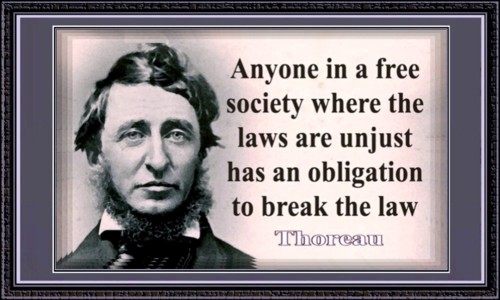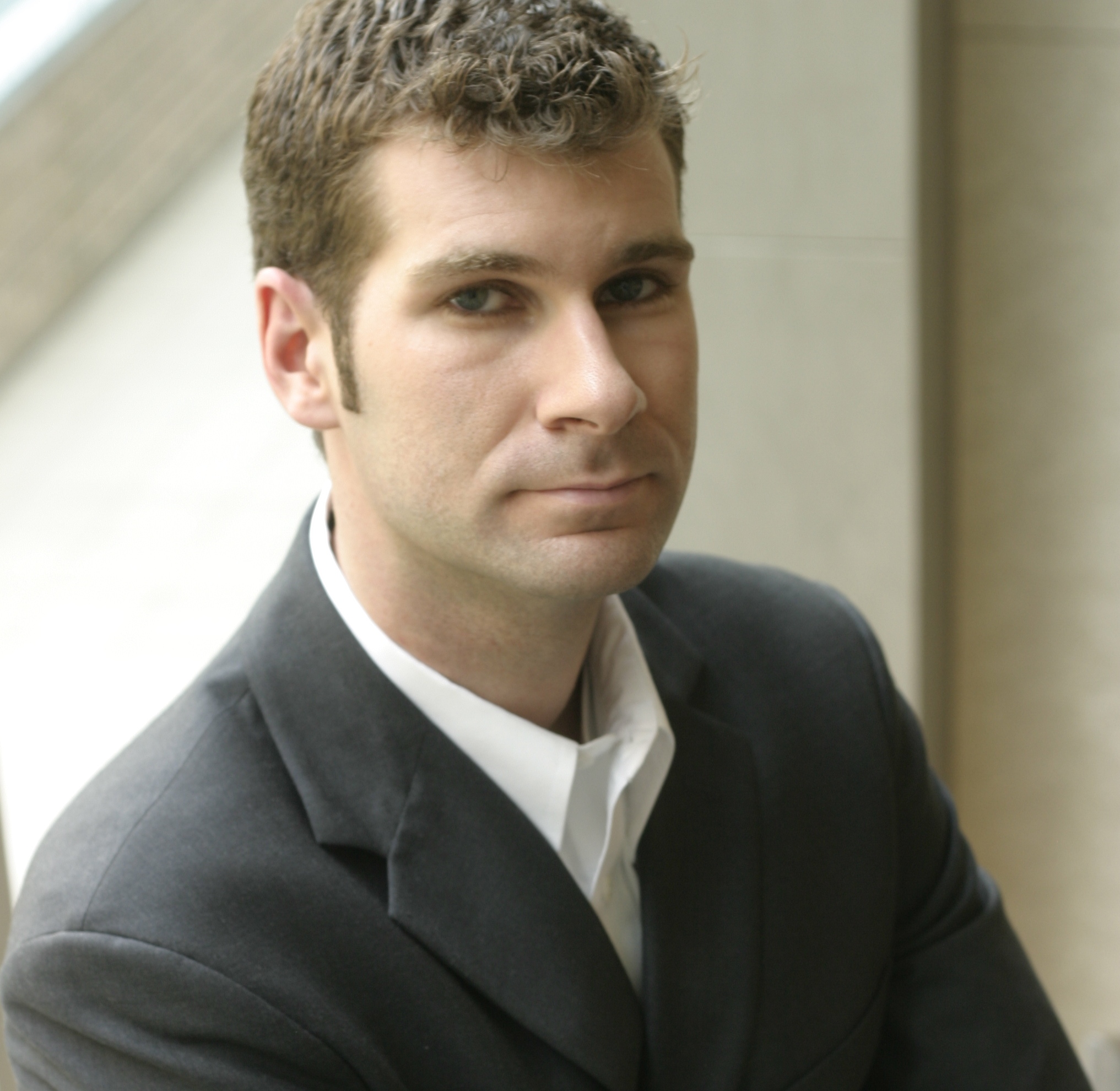
Transcendentalist Henry David Thoreau is best known for his seminal book Walden (first published in 1854 in Boston), which advocates simple living in natural surroundings; and his 1849 essay Resistance to Civil Government (a/k/a Civil Disobedience) which avers that the individual has an obligation to disobey the laws of an unjust state.
Posting as ‘TheTrueHOOHA’
By Bjarne Rostaing
Edward Snowden and Henry David Thoreau have little in common other than WASPdom.
Snowden is from a respectable middle class family, many of whose members worked for the government, and he happens to have a gift for computers and electronic information. Nothing to raise suspicion, and it was natural for him to work for the CIA, which he did for a time.
Thoreau was a different animal, a Boston Brahmin of the New England aristocracy, a dominant elite full of independent thinkers of impeccable roots going back to colonial times. The Adamses, Emerson, Hawthorne, William and Henry James, Melville, and the physician and writer Oliver Wendell Holmes Sr. (who coined the term) were members.
Snowden held tech jobs, Thoreau went off to live in the woods and think. He was a theorist, opinionated, lacking finesse. Not a hands-on guy or a leader in his set, but strong in his views. He wrote Walden, and then he came up with the notion of “civil disobedience,” a wild and crazy idea that when government creates a stench that your conscience can’t abide, it’s appropriate to be “disobedient,” and if possible, “stop the machine,” by which he meant the government.
The idea had legs, and so Thoreau became the patron saint of whistleblowers.
Snowden is a loner, too, like many techs, and very expert on information systems. He bypassed college degrees but was eminently employable, and smart enough to be trained by the government as a Certified Ethical Hacker (CEH), an ambiguous and controversial government qualification.
He was always civil, and became extremely disobedient. In his world he will be remembered as a heroic practitioner of what Thoreau wrote about in his Boston cocoon — though also a traitor by traditional definition.

Computer expert Edward Snowden is a former CIA employee and contractor for the United States Government who leaked classified information from the Na- tional Security Agency (NSA) in 2013. He currently has temporary asylum and is living in Russia, where he is likely revealing additional secrets to the Russians.
Coming from a responsible family with government connections may have protected him from close CIA scrutiny and allowed him what must have been a very high security clearance.
He needed to roam freely to solve the problems he was assigned. With his gifts and background, he would always find work, and therein lies a tale of corporate complacency. Though his online views were no secret and should have raised eyebrows, no one paid attention:
Good employee, good manners, good family. However “good manners” does not mean no balls, as patriotic barflies tend to think.
After CIA, Snowden ended working for Booz Allen Hamilton, a company rarely referenced in popular media. Booz Allen is a management consulting firm specializing in technology, defense and intelligence, and a big player ($5-6 billion yearly) in our increasingly privatized intelligence community.
Privatization is a strong current trend that has spawned a profitable industry; and Congress sees it as a good thing, reducing the size of the government. However privatization has its problems.
There’s Snowden, and there were Halliburton’s electrocution showers, and Blackwater, which existed in a convenient legal limbo that allowed them to break their own rules. Accountability is vague with these consulting companies, and no significant heads rolled in these cases.
Privatization can arguably reduce government size, but basically it’s all about the bottom line, which means bean counters and cost-cutting. There’s big money in the game, and bean counters are influential. At Booz Allen they saved money by shortcutting Snowden’s vetting.
Snowden was no trained spy, and didn’t bother to cover his tracks, but this went unnoticed. Long story short, Booz Allen apparently had no idea who he was, though he was open about himself and his views on the Internet, including his sexual and donut preferences.
A CLASSIC HIGH-END UNPREDICTABLE YOUNG TECH
Posting as “TheTrueHOOHA” he sounds sophomoric and independent, a classic high-end unpredictable young tech. But he could solve problems others could not, and perhaps because he’d been accepted by the CIA, Booz Allen accepted him and gave him access to graze in fields of absolutely top secret information, revealing, among other things, how the government routinely penetrates our private lives.
The media excoriate and extol Snowden, but Booz Allen remains under the radar, not held accountable, and they continue to get enormous contracts.
Why? They are huge (over five to six billion annual revenue); the government is their only employer; and they are extremely well connected.
They also kiss the Clinton ring, donating money to the Clinton Global Initiative, a part of the Bill and Hillary’s Foundation. And they have some very influential employees: James Woolsey, a former CIA Director, has worked for them, as have current National Intelligence Director James Clapper and similar figures.
Like Halliburton and other giant privatizers, they often work on no-bid contracts. In any case, no heads rolled after Snowden’s revelations, and it was business as usual.

Political scientist and international relations scholar P.W. Singer is widely considered to be America’s preeminent specialist on 21st Century warfare.
Private contractors now supply at least half of our specialized troops and intelligence personnel. This surprising fact becomes comprehensible as part of the privatization trend, which has significant added value: it blurs accountability.
Blackwater broke the rules they worked under in Iraq, initiating firefights and shooting civilians very indiscriminately, and there were no consequences other than a name change.
P. W. Singer, author of Corporate Warriors: The Rise of the Privatized Military Industry, notes that these companies operate in over 50 countries. Their use was implemented quickly because consultant/contractor status allowed them to do things that would be illegal for government employees.
Singer estimates that in the 1990s there were 50 military personnel for every one contractor. Now the ratio is less than 10 to one.
Intelligence was on the same path. Robert Grenier, former CIA station chief in Islamabad, Pakistan, and subsequently in charge of the CTC (CounterTerrorism Center), says that more than half the personnel who worked under him at CTC were private contractors.
“They were coming in, and they were all over the place,” Grenier said, and he was comfortable with it. ?
Tim Shorrock, who wrote the definitive book, Spies for Hire, obtained and published an unclassified document from the Office of the Director of National Intelligence showing that 70 percent of the U.S. intelligence budget was spent on private contractors.
Blackwater and Snowden make it obvious that legality and accountability are issues that won’t go away, but neither will they be discussed openly in significant venues, because both employer and contractor like the status quo, and it’s not difficult to wave the flag and demonize the messenger in the name of Homeland Security.
THE ETHICAL CORE THAT JUSTIFIES WHISTLEBLOWERS
Silencing and/or destroying whistleblowers is a routine procedure.
Thoreau was a bit of a crank, but civil disobedience is a powerful idea, the ethical core that justifies whistleblowers to themselves.
They lead a hellish life once they commit. If they report on security matters, their employment is made uncomfortable. Legally outgunned by the government, they often lose their jobs, then friends and family. Finding another job becomes almost impossible, income declines or disappears, and legal fees mount. It’s a very slippery slope, and getting your life back is an impossible dream.
The inevitable question about Snowden is whether he did more harm or good. It’s very doubtful that we’d ever have known about the clandestine surveillance program PRISM (and the access to our phone records, etc.) without him.
Obviously he broke the law, but as Thoreau suggested, civil disobedience is at times a moral obligation. In his bucolic Walden world he wouldn’t have been concerned with having his life ripped apart.
The Brahmins were very secure.
bfrostaing@voiceofbaltimore.org
EDITOR’S NOTE:
“Inside Pitch” is a Voice of Baltimore commentary/opinion column authored by various contributors, along with VoB editors and staff. It has been a regular feature of this website since 2013.
![]() Bjarne (Barney) Rostaing is the author of Epstein’s Pancake, a novel published by St. Mark’s Press and available for purchase on Amazon.com and at Barnes & Noble — click here and here.
Bjarne (Barney) Rostaing is the author of Epstein’s Pancake, a novel published by St. Mark’s Press and available for purchase on Amazon.com and at Barnes & Noble — click here and here.
He was an editor at the SoHo Weekly News, won a First Place AFI Award for a sports video, and worked with Uma Thurman in her film debut in “Kiss Daddy Goodnight” (1987). As a sports writer, Rostaing exposed — in Sports Illustrated — the 1984 U.S. Olympic blood doping scandal.
His earlier works include Breeders (St. Mark’s Press/2011), a crime novel set in the world of horse racing; Phantom of the Paradise (Dell), based on the 1974 horror film written and directed by Brian De Palma; and Bill Walton’s Total Book of Bicycling (Bantam Books/1985).
Originally from Bantam, Conn., the “Red Diaper Baby” lives and works in Brooklyn, N.Y.
To learn more about Epstein’s Pancake, click here.






July 18th, 2016 - 6:02 AM
Total agreement. You can’t make this stuff up. We’ve had two amateur presidents back to back, and this time we’ll do no better. Clinton is a bought and paid for lobby creature who voted to invade Iraq and then doubled down in Libya, AGAIN with no follow up plan (!?). Then Ukraine, where we set off yet another ethnic civil war. Change is her last option. Trump is a lot smarter and a lot crazier. Things would change for sure, but YIKES! — what a choice.